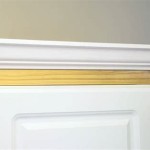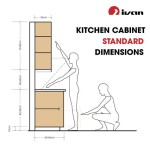Should I Paint My Kitchen Cabinets With Oil Based Paint?
The decision to paint kitchen cabinets is a significant undertaking, influencing both the aesthetic appeal and longevity of this crucial area in the home. Among the various paint options available, oil-based paint presents a compelling, yet complex, choice for cabinet refinishing. This article explores the advantages and disadvantages associated with oil-based paint for kitchen cabinets, providing information to assist homeowners in making an informed decision that aligns with their needs and capabilities.
Durability and Finish of Oil-Based Paint
One of the primary reasons homeowners consider oil-based paint for kitchen cabinets is its renowned durability. Oil-based paints form a hard, resilient finish that is resistant to scratches, chips, and stains. This is particularly important in a high-traffic area like the kitchen, where cabinets are frequently exposed to impacts, spills, and cleaning agents. The superior hardness of the finish contributes to a longer lifespan for the paint job, reducing the need for frequent touch-ups or complete repainting.
In addition to its physical durability, oil-based paint typically offers a smoother, more even finish compared to water-based alternatives. The paint's leveling properties allow it to flow easily, minimizing brushstrokes and imperfections. This results in a professional-looking surface that enhances the overall visual appeal of the kitchen cabinets. This smooth finish is particularly desirable for homeowners seeking a high-end aesthetic.
Furthermore, oil-based paint provides excellent adhesion to various surfaces, including wood, metal, and previously painted cabinets. This strong bond ensures that the paint adheres firmly to the substrate, preventing peeling or flaking over time. Proper surface preparation is still crucial, but oil-based paints generally offer a more forgiving application in terms of adhesion compared to some water-based options.
However, while the durability and finish are key advantages, it is important to consider the environmental impact and health concerns associated with oil-based paints. These paints contain volatile organic compounds (VOCs), which are released into the air during and after application. VOCs can contribute to respiratory problems and other health issues, especially in poorly ventilated areas. Regulations on VOC content in paints have become increasingly stringent in many regions, influencing the availability and formulations of oil-based paints.
Therefore, homeowners must carefully weigh the durability and finish benefits against the potential health and environmental concerns. Adequate ventilation during application and drying is essential when using oil-based paints to minimize exposure to VOCs. Furthermore, considering alternative low-VOC options, even if they are water-based, might be a healthier choice, although they might require more frequent upkeep.
Application Process and Skill Requirements
Applying oil-based paint requires a specific level of skill and attention to detail. Unlike water-based paints, oil-based paints have a longer drying time, which can be both an advantage and a disadvantage. The extended drying time allows for greater flexibility in correcting imperfections and achieving a smooth finish. However, it also means that the project will take longer to complete, and the cabinets will be out of commission for an extended period.
Proper surface preparation is crucial for a successful oil-based paint application. The cabinets must be thoroughly cleaned, sanded, and primed before painting. Removing any existing paint, grease, or dirt is essential to ensure proper adhesion. Sanding creates a slightly rough surface that allows the paint to grip the substrate more effectively. A high-quality primer designed for oil-based paints should be applied to seal the surface and provide a uniform base for the topcoat.
The application technique also plays a significant role in the final outcome. Oil-based paints typically require the use of natural bristle brushes or spray equipment. Synthetic brushes designed for water-based paints are generally not suitable for oil-based paints, as they may not hold the paint effectively or provide a smooth finish. Spraying oil-based paint can achieve a flawless finish, but it requires specialized equipment and experience to avoid drips, runs, and overspray.
Cleaning up after using oil-based paint is another consideration. Oil-based paints require the use of solvents such as mineral spirits or turpentine for cleaning brushes, rollers, and equipment. These solvents can be hazardous and require proper disposal to avoid environmental contamination. In contrast, water-based paints can be cleaned with soap and water, making cleanup much easier and safer.
Given the skill requirements and the complexities of the application process, homeowners should honestly assess their abilities before undertaking an oil-based paint project. If they lack the necessary experience or confidence, hiring a professional painter is advisable to ensure a high-quality and long-lasting finish. Attempting to apply oil-based paint without proper preparation or technique can result in a subpar outcome, leading to frustration and additional expenses.
Cost Considerations and Long-Term Value
The cost of oil-based paint compared to water-based alternatives is a significant factor in the decision-making process. Oil-based paints typically have a higher purchase price than water-based paints. This is due to the more complex manufacturing process and the higher cost of the raw materials used in their production.
In addition to the cost of the paint itself, homeowners must also factor in the cost of other materials, such as primer, brushes, rollers, solvents, and safety equipment. The total cost of the project can quickly add up, especially if specialized equipment like a paint sprayer is required. Therefore, a comprehensive budget should be prepared before starting the project to avoid unexpected expenses.
However, the higher upfront cost of oil-based paint may be offset by its long-term value. The superior durability and longevity of oil-based paint mean that it will likely require less frequent repainting compared to water-based paint. This can save homeowners money in the long run, as they will not need to purchase paint and spend time on repainting as often.
Furthermore, the enhanced aesthetic appeal of oil-based paint can increase the value of the kitchen and the overall home. A professionally painted kitchen with a smooth, durable finish can be a significant selling point for potential buyers. Therefore, investing in oil-based paint can be a wise investment in the long-term value of the property.
Consideration should also be given to the cost of professional labor. Due to the complexities of applying oil-based paint, hiring a professional painter can be more expensive than hiring someone to apply water-based paint. However, the expertise and experience of a professional can ensure a high-quality finish and minimize the risk of errors, which can ultimately save money in the long run. A thorough cost-benefit analysis should be conducted to determine whether the long-term value of oil-based paint justifies the higher upfront cost.

5 Places To Use Oil Based Paint

Best Kitchen Cabinet Paint Finish For Professional Results Pennies A Fortune

How To Paint Kitchen Cabinets Best Color Ideas Cost

Avoid These Mistakes How To Paint Cabinets That Are Already Painted Grace In My Space

The Best Way To Paint Kitchen Cabinets No Sanding Palette Muse

Water Based Vs Oil Paints Which One Should You Buy Is The Best Option For

Best Kitchen Cabinet Paint Finish For Professional Results Pennies A Fortune

6 Tips For Painting Your Kitchen Cabinets

How To Paint Kitchen Cabinets From A Diyer Who Has Done It 3 Times

Repainting Your Kitchen Cabinets Oil Latex Or Acrylic N Hance Of Sioux Falls
Related Posts








